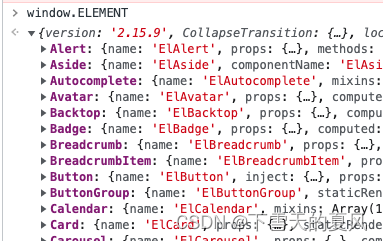目录
- 目录结构和使用
- 1,npm 安装
- 1.1,完整引入
- 1.2,按需引入
- 2,CDN
- 3,国际化
接上文:element-ui 打包流程源码解析(上)
文章中提到的【上文】都指它 ↑
目录结构和使用
我们从使用方式来分析,为什么要打包成上面的目录结构。
1,npm 安装
每个模块都有 package.json 文件,其中的 main 字段表示模块的入口文件。
{ "name": "element-ui", "version": "2.15.9", "main": "lib/element-ui.common.js" }1.1,完整引入
import Vue from 'vue'; import ElementUI from 'element-ui'; import 'element-ui/lib/theme-chalk/index.css'; import App from './App.vue'; Vue.use(ElementUI); new Vue({ el: '#app', render: h => h(App) });样式引入不必多说。
完整引入对应的是上文中第2.3节 build/webpack.common.js 打包后的内容,其中 output 输出设置:
module.exports = { entry: { app: ['./src/index.js'] }, // ... output: { path: path.resolve(process.cwd(), './lib'), filename: 'element-ui.common.js', libraryExport: 'default', library: 'ELEMENT', libraryTarget: 'commonjs2' }, }注意到:webpack 设置的打包名称是 ELEMENT,但引入时却是 ElementUI,
因为 element-ui 使用的 webpack4 版本,所以设置 libraryTarget: 'commonjs2' 时 ,会自动忽略output.library。
所以,import导入的名称随意,只是一个对象而已。
import ElementUI from 'element-ui'; Vue.use(ElementUI);
Vue.use(ElementUI)会调用 install 方法,也就是入口文件 ./src/index.js中的 install 方法,来遍历每个组件,使用 Vue.component全局注册每个组件,实现全量引入。
/* Automatically generated by './build/bin/build-entry.js' */ import Pagination from '../packages/pagination/index.js'; // ... 其他组件略 import locale from 'element-ui/src/locale'; import CollapseTransition from 'element-ui/src/transitions/collapse-transition'; const components = [ Pagination, Result, CollapseTransition ]; const install = function(Vue, opts = {}) { locale.use(opts.locale); locale.i18n(opts.i18n); components.forEach(component => { Vue.component(component.name, component); }); Vue.use(InfiniteScroll); Vue.use(Loading.directive); Vue.prototype.$ELEMENT = { size: opts.size || '', zIndex: opts.zIndex || 2000 }; Vue.prototype.$loading = Loading.service; Vue.prototype.$msgbox = MessageBox; Vue.prototype.$alert = MessageBox.alert; Vue.prototype.$confirm = MessageBox.confirm; Vue.prototype.$prompt = MessageBox.prompt; Vue.prototype.$notify = Notification; Vue.prototype.$message = Message; }; /* istanbul ignore if */ if (typeof window !== 'undefined' && window.Vue) { install(window.Vue); } export default { version: '2.15.9', locale: locale.use, i18n: locale.i18n, install, CollapseTransition, Loading, Pagination, // ... 其他组件略 };1.2,按需引入
官网参考
import Vue from 'vue'; import { Button, Select } from 'element-ui'; import App from './App.vue'; Vue.component(Button.name, Button); Vue.component(Select.name, Select); /* 或写为 * Vue.use(Button) * Vue.use(Select) */ new Vue({ el: '#app', render: h => h(App) });前面说了,package.json 中的 main 字段是模块的入口,
{ "name": "element-ui", "version": "2.15.9", "main": "lib/element-ui.common.js" }所以想实现这样引入,注意样式也要一起引入。
import { Button, Select } from 'element-ui';1,首先得把模块分别打包,对应上文中第2.4节 build/webpack.component.js 打包后的目录:
-- lib -- pagination.js -- dialog.js -- ...
2,编译引入语法,变成下面这样
import { Button, Select } from 'element-ui'; // to var button = require('element-ui/lib/button') require('element-ui/lib/button/style.css') // 样式目录可以配置,这里只是举例这就需要借助 babel-plugin-component 来实现:
npm install babel-plugin-component -D
指定 libraryName和 styleLibraryName,最终效果:
require('{libraryName}/lib/button') require('{libraryName}/lib/{styleLibraryName}/button/style.css'){ "presets": [["es2015", { "modules": false }]], "plugins": [ [ "component", { "libraryName": "element-ui", "styleLibraryName": "theme-chalk" } ] ] }另外,每个组件中都自定义了 install 方法,所以也可直接使用 Vue.use() 注册组件。
import ElButton from './src/button'; /* istanbul ignore next */ ElButton.install = function(Vue) { Vue.component(ElButton.name, ElButton); }; export default ElButton;2,CDN
unpkg:是一个内容来自 npm 的全球CDN,可以指定版本号。比如 unpkg.com/element-ui@2.15.9
引入 css,不必多说。
引入的 js,对应上文第2.2节 build/webpack.conf.js 的输出:
module.exports = { entry: { app: ['./src/index.js'] }, // ... output: { path: path.resolve(process.cwd(), './lib'), publicPath: '/dist/', filename: 'index.js', libraryExport: 'default', library: 'ELEMENT', libraryTarget: 'umd', globalObject: 'typeof self !== \'undefined\' ? self : this' }, }打包为 umd 模块(自执行函数)
(function webpackUniversalModuleDefinition(root, factory) { if(typeof exports === 'object' && typeof module === 'object') module.exports = factory(); else if(typeof define === 'function' && define.amd) define([], factory); else if(typeof exports === 'object') exports["ELEMENT"] = factory(); else root["ELEMENT"] = factory(); })(typeof self !== 'undefined' ? self : this, () => { return _entry_return_; // 此模块返回值,是入口 chunk 返回的值 });在 HTML 引入后,可直接在 js 中使用 (window || self || this).ELEMENT 访问。组件也可直接在页面内使用。
参考 element-ui 官网例子

3,国际化
官网参考
npm 的使用方式不多赘述,就是引入了上文第2.5节 npm run build:utils 生成的 locale 目录下的多语言文件。
主要介绍下CDN的国际化
在上文第2.6节 npm run build:umd 中,对生成的 umd 模块做了一些替换:以打包后的 zh-CN.js 为例。
(function (global, factory) { if (typeof define === "function" && define.amd) { // 原:define('zh-CN', ['module', 'exports'], factory); define('element/locale/zh-CN', ['module', 'exports'], factory); } else if (typeof exports !== "undefined") { factory(module, exports); } else { var mod = { exports: {} }; factory(mod, mod.exports); // 原:global.zhCN = mod.exports; global.ELEMENT.lang = global.ELEMENT.lang || {}; global.ELEMENT.lang.zhCN = mod.exports; } })(this, function (module, exports) { // 被打包文件的内容 }我们对比下CDN引入多语言的方式就明白了
因为通过 CDN 引入后 umd 模块的 element-ui(一个自执行函数)后,
umd 会同时以 AMD、CommonJS 和全局属性形式暴露。这样可以在 commonjs 模块和 amd 和浏览器环境同时使用该库。
会给浏览器添加一个全局变量 ELEMENT,可以通过this.ELEMENT访问。
所以,上面替换的作用是:当引入对应的多语言文件时,可以通过 this.ELEMENT.lang访问到对应的多语言文件。
element-ui 打包整体流程介绍完毕,希望对你有帮助。
以上。
猜你喜欢
网友评论
- 搜索
- 最新文章
- 热门文章
